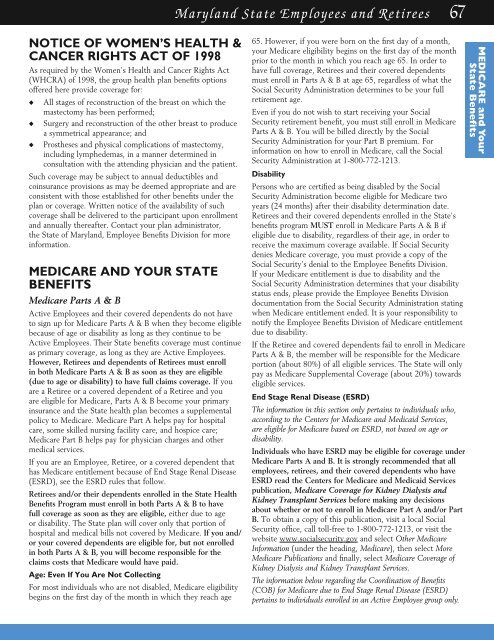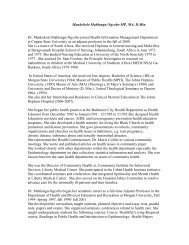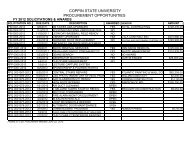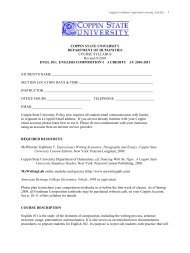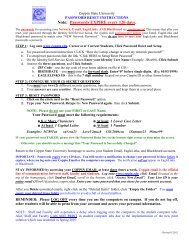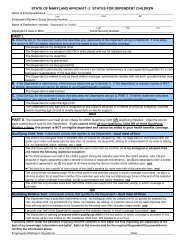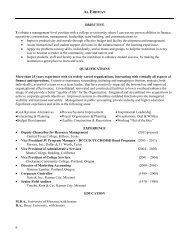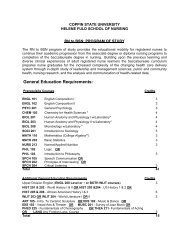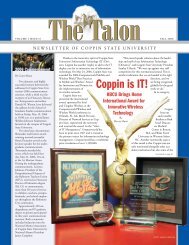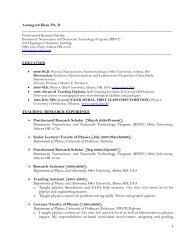FY2011 Health Benefits Booklet
FY2011 Health Benefits Booklet
FY2011 Health Benefits Booklet
Create successful ePaper yourself
Turn your PDF publications into a flip-book with our unique Google optimized e-Paper software.
Maryland State Employees and Retirees 67<br />
Notice of Women’s <strong>Health</strong> &<br />
Cancer Rights Act of 1998<br />
As required by the Women’s <strong>Health</strong> and Cancer Rights Act<br />
(WHCRA) of 1998, the group health plan benefits options<br />
offered here provide coverage for:<br />
u All stages of reconstruction of the breast on which the<br />
mastectomy has been performed;<br />
u Surgery and reconstruction of the other breast to produce<br />
a symmetrical appearance; and<br />
u Prostheses and physical complications of mastectomy,<br />
including lymphedemas, in a manner determined in<br />
consultation with the attending physician and the patient.<br />
Such coverage may be subject to annual deductibles and<br />
coinsurance provisions as may be deemed appropriate and are<br />
consistent with those established for other benefits under the<br />
plan or coverage. Written notice of the availability of such<br />
coverage shall be delivered to the participant upon enrollment<br />
and annually thereafter. Contact your plan administrator,<br />
the State of Maryland, Employee <strong>Benefits</strong> Division for more<br />
information.<br />
Medicare and Your State<br />
<strong>Benefits</strong><br />
Medicare Parts A & B<br />
Active Employees and their covered dependents do not have<br />
to sign up for Medicare Parts A & B when they become eligible<br />
because of age or disability as long as they continue to be<br />
Active Employees. Their State benefits coverage must continue<br />
as primary coverage, as long as they are Active Employees.<br />
However, Retirees and dependents of Retirees must enroll<br />
in both Medicare Parts A & B as soon as they are eligible<br />
(due to age or disability) to have full claims coverage. If you<br />
are a Retiree or a covered dependent of a Retiree and you<br />
are eligible for Medicare, Parts A & B become your primary<br />
insurance and the State health plan becomes a supplemental<br />
policy to Medicare. Medicare Part A helps pay for hospital<br />
care, some skilled nursing facility care, and hospice care;<br />
Medicare Part B helps pay for physician charges and other<br />
medical services.<br />
If you are an Employee, Retiree, or a covered dependent that<br />
has Medicare entitlement because of End Stage Renal Disease<br />
(ESRD), see the ESRD rules that follow.<br />
Retirees and/or their dependents enrolled in the State <strong>Health</strong><br />
<strong>Benefits</strong> Program must enroll in both Parts A & B to have<br />
full coverage as soon as they are eligible, either due to age<br />
or disability. The State plan will cover only that portion of<br />
hospital and medical bills not covered by Medicare. If you and/<br />
or your covered dependents are eligible for, but not enrolled<br />
in both Parts A & B, you will become responsible for the<br />
claims costs that Medicare would have paid.<br />
Age: Even If You Are Not Collecting<br />
For most individuals who are not disabled, Medicare eligibility<br />
begins on the first day of the month in which they reach age<br />
65. However, if you were born on the first day of a month,<br />
your Medicare eligibility begins on the first day of the month<br />
prior to the month in which you reach age 65. In order to<br />
have full coverage, Retirees and their covered dependents<br />
must enroll in Parts A & B at age 65, regardless of what the<br />
Social Security Administration determines to be your full<br />
retirement age.<br />
Even if you do not wish to start receiving your Social<br />
Security retirement benefit, you must still enroll in Medicare<br />
Parts A & B. You will be billed directly by the Social<br />
Security Administration for your Part B premium. For<br />
information on how to enroll in Medicare, call the Social<br />
Security Administration at 1-800-772-1213.<br />
Disability<br />
Persons who are certified as being disabled by the Social<br />
Security Administration become eligible for Medicare two<br />
years (24 months) after their disability determination date.<br />
Retirees and their covered dependents enrolled in the State’s<br />
benefits program must enroll in Medicare Parts A & B if<br />
eligible due to disability, regardless of their age, in order to<br />
receive the maximum coverage available. If Social Security<br />
denies Medicare coverage, you must provide a copy of the<br />
Social Security’s denial to the Employee <strong>Benefits</strong> Division.<br />
If your Medicare entitlement is due to disability and the<br />
Social Security Administration determines that your disability<br />
status ends, please provide the Employee <strong>Benefits</strong> Division<br />
documentation from the Social Security Administration stating<br />
when Medicare entitlement ended. It is your responsibility to<br />
notify the Employee <strong>Benefits</strong> Division of Medicare entitlement<br />
due to disability.<br />
If the Retiree and covered dependents fail to enroll in Medicare<br />
Parts A & B, the member will be responsible for the Medicare<br />
portion (about 80%) of all eligible services. The State will only<br />
pay as Medicare Supplemental Coverage (about 20%) towards<br />
eligible services.<br />
End Stage Renal Disease (ESRD)<br />
The information in this section only pertains to individuals who,<br />
according to the Centers for Medicare and Medicaid Services,<br />
are eligible for Medicare based on ESRD, not based on age or<br />
disability.<br />
Individuals who have ESRD may be eligible for coverage under<br />
Medicare Parts A and B. It is strongly recommended that all<br />
employees, retirees, and their covered dependents who have<br />
ESRD read the Centers for Medicare and Medicaid Services<br />
publication, Medicare Coverage for Kidney Dialysis and<br />
Kidney Transplant Services before making any decisions<br />
about whether or not to enroll in Medicare Part A and/or Part<br />
B. To obtain a copy of this publication, visit a local Social<br />
Security office, call toll-free to 1-800-772-1213, or visit the<br />
website www.socialsecurity.gov and select Other Medicare<br />
Information (under the heading, Medicare), then select More<br />
Medicare Publications and finally, select Medicare Coverage of<br />
Kidney Dialysis and Kidney Transplant Services.<br />
The information below regarding the Coordination of <strong>Benefits</strong><br />
(COB) for Medicare due to End Stage Renal Disease (ESRD)<br />
pertains to individuals enrolled in an Active Employee group only.<br />
MEDICARE and Your<br />
State <strong>Benefits</strong>


